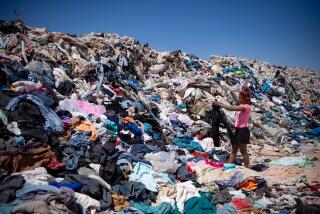Land of the Lost--And Unclaimed, Too
SCOTTSBORO, Ala. — A sapphire and diamond bracelet. Hermes scarves. Gianni Versace dresses. Burberry raincoats for men. A yellow silk Christian Dior jacket. They’re all here, along with expensive sporting equipment, fancy luggage and high-priced cameras.
So where exactly are we? Barneys on Madison Avenue? Harrods in London? Well, no. Actually, we’re at the Unclaimed Baggage Center in Alabama.
Or to put it another way: We’re here in the Lost Luggage Capital of the World, a place where a $15,000 sapphire and diamond bracelet goes for $7,500 and a $500 Burberry raincoat for $78.50. And those $230 Hermes scarves? Just $45. A great bargain, yes, but so are the Versace dresses: $55, instead of the usual $1,000 or so.
No two ways about it: At the Unclaimed Baggage Center you pay rock-bottom prices for every item. And every item here--from the size 38B black lace teddy ($3) to the fancy Aprica baby stroller ($15)--has a story to tell.
Each day, hundreds of bags--that the major air carriers claim cannot be reunited with their owners--are bought by Unclaimed Baggage and brought to Scottsboro, where the luggage is opened, its contents sorted, cleaned and priced.
Who knew in 1970, when its founder, an enterprising insurance salesman named H. Doyle Owens, bought a hundred or so bags left on Greyhound buses and sold them from card tables, that it would make him a rich man and put Scottsboro on the map?
*
Officials at the Unclaimed Baggage Center are reluctant to talk about how the business works.
The airlines, it turns out, also are less than eager to discuss their business arrangements with the Scottsboro store. Both, understandably, prefer not to call attention to the fact that they are profiting from selling other people’s belongings, a detail that might annoy such travelers as the woman whose $10,000 diamond ring is now in Scottsboro.
However, Bryan Owens, who acquired the company from his father last fall, will say that his company has contracts with most of the major airlines. But “contractually I can’t name names . . . we don’t disclose the carriers we’re working with. But everyone in the industry knows us.”
The major carriers, he says, “everybody from Southwest to American and United, have to report monthly the number of bags mishandled.” As reported to the Department of Transportation, of the nearly 2 million bags moved each day, between 0.5% and 1% are mishandled or misrouted--that’s between 10,000 and 20,000 each day. Of those, all but 200 bags eventually are matched up with their owners, most within 24 hours.
Of course, airlines seldom use the word “lost” in connection with baggage. “It’s not that the bag is lost; it fails to make a flight,” says Joe Hopkins, a United Airlines spokesman. However, he concedes that a bag becomes officially lost after three months. “Then we settle with the customer . . . and after that we hand the bag off to a salvage company in Scottsboro.”
Actually, the airline sells the bag to the salvage company. Which brings up the question: How much is an airline paid for an unclaimed bag and how is that rate determined? “We simply don’t comment on that,” Hopkins says.
Bryan Owens won’t comment on how much money changes hands.
He does say, however, that the responsibility for finding the owner of lost luggage lies with the airline. “It is incumbent upon them to find the owner and, for the most part, they try very hard because it is in their interest. Their liability is $1,250 per ticketed passenger. That’s per passenger, not per bag.”
But who would be dumb enough to chance losing a $15,000 sapphire bracelet or $10,000 diamond ring in their checked baggage.
“Well, there’s also lost-and-found unclaimed,” Bryan Owens says. “Some of the items are left on board the plane--in the lavatory, in the overhead, in the seat back.”
And if that now sapphire-less woman should read this and pay a visit to Scottsboro, could she lay claim to her bracelet or would she have to buy it back?
“Theoretically, her claim would have been settled and she would have been paid for what she lost,” Owens says. “So she would have to buy it back. It’s an arm’s length transaction for us and we just provide a necessary service. We’re capitalists.”
More to Read
Sign up for The Wild
We’ll help you find the best places to hike, bike and run, as well as the perfect silent spots for meditation and yoga.
You may occasionally receive promotional content from the Los Angeles Times.






